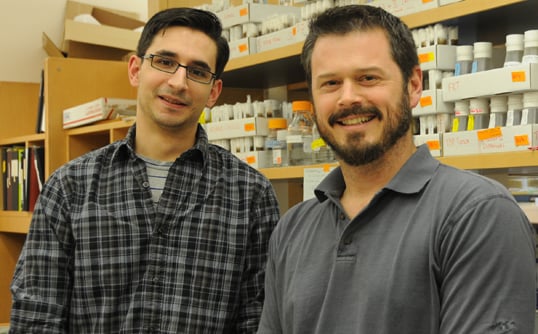
Jacob Kushkuley (left) is among only 70 students selected nationwide to participate in the HHMI Medical Research Fellows Program. Kushkuley will conduct research in the lab of Marc Freeman, PhD (right), Howard Hughes Medical Institute Investigator and vice chair and associate professor of neurobiology.
Third year medical student Jacob Kushkuley is among 70 of the nation’s top medical and veterinary students selected to participate in the 26th class of the HHMI Medical Research Fellows Program, a $2.8 million annual initiative to increase the training of future physician-scientists. Kushkuley will put his medical studies on hold for a year to conduct research in the lab of Marc Freeman, PhD, Howard Hughes Medical Institute Investigator and vice chair and associate professor of neurobiology.
“The HHMI fellowship provides a great opportunity to conduct a year of research that I might not get at another time in my life,” said Kushkuley. He and Dr. Freeman collaborated on the winning HHMI grant proposal.
While an undergraduate biology major at UMass Lowell, Kushkuley was part of a research team whose findings on neuronal structure were published in the Journal of Cell Science. Kushkuley is now interested in exploring Wallerian degeneration, the process through which an injured axon degenerates. Freeman’s lab discovered a gene—dSarm/Sarm1—responsible for actively promoting axon destruction after injury.
Wallerian degeneration was long believed to be a passive response to injury, but the Freeman lab was able to identify the gene responsible for axon degeneration by meticulously examining fruit flies for mutations that allowed damaged nerve cells to live long after injury. The discovery has significant therapeutic potential not only for nerves damaged by injury, but also for neurodegenerative diseases such as ALS and Huntington’s disease. Kushkuley is excited to have the opportunity to be part of this novel area of research that Freeman’s discovery has opened up, in particular in the realm of axonal injury.
“The majority of nervous system injuries experienced by patients are not axotomies, they’re actually injuries involving nerve crush or stretch, which after an initial lag phase lead to degeneration and functional loss,” said Freeman. “Jake’s project is very exciting since it will explore whether preserving the axon after injury beyond that key lag phase will lead to enhanced nerve preservation and recovery of nerve function. If so, it would provide compelling evidence that anti-Sarm1 therapeutics are exciting new options for treating patients with nerve injuries.”
This year, HHMI received 191 fellowship applications from students representing 68 institutions. Each applicant was required to submit a research plan to work in a specific lab with a mentor they had identified. Kushkuley is one of 17 fellows who will do research in the lab of an HHMI scientist.
The HHMI Medical Research Fellows Program has funded more than 1,500 students since its start in 1989.